Questions about Muscovy ducks? You’re in the right place! Get the answers to 33 Muscovy duck questions right here. You’ll learn about the red lumpy stuff on their face, their diet, size, and more. Plus lots of photos!
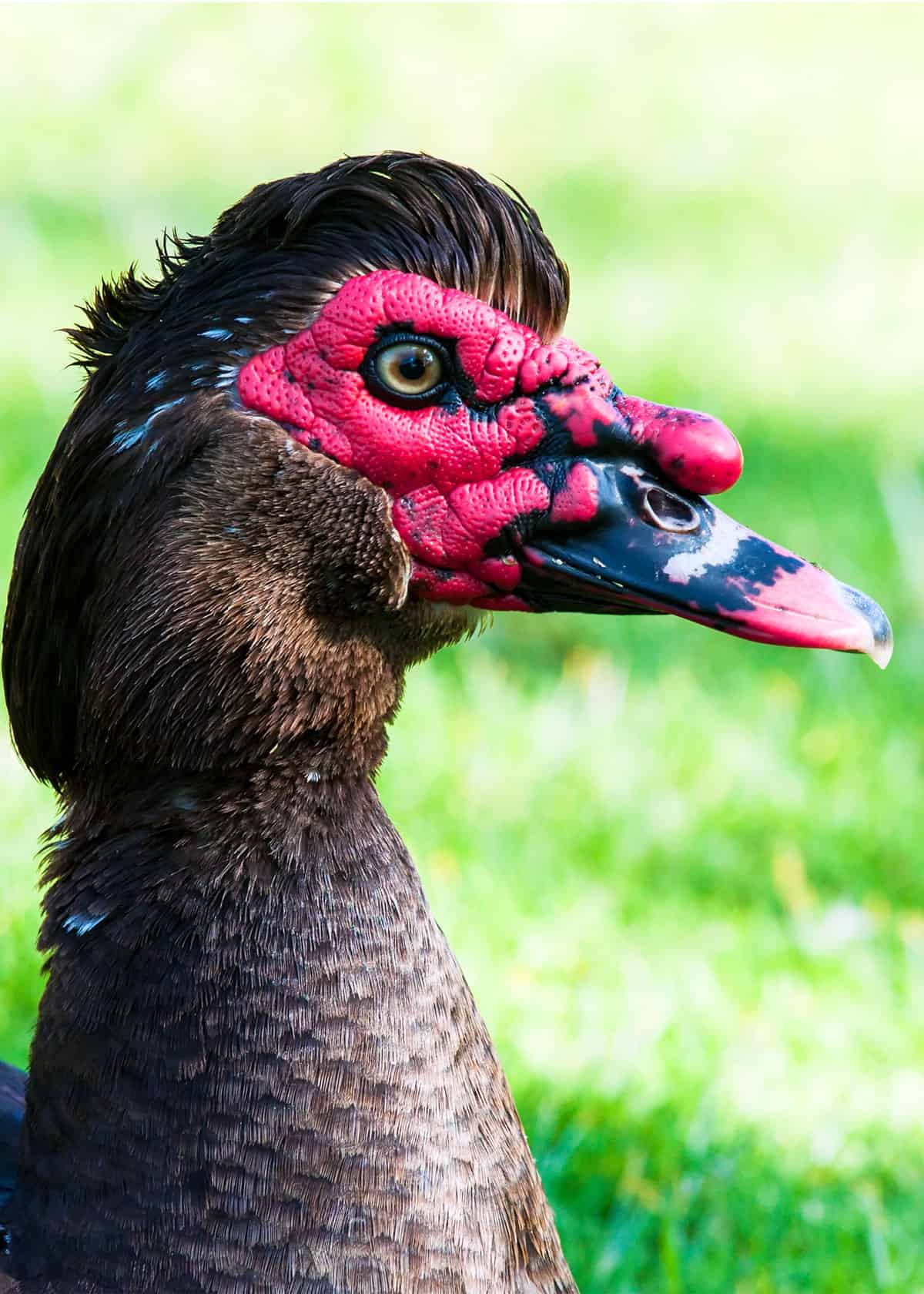
Table of Contents
33 Muscovy Duck Facts
They don’t look like ducks. They don’t quack like ducks. In some languages, they aren’t even called ducks.
Welcome to the world of Muscovy ducks. They’re some of the strongest members of the waterfowl family, but they’re also really fun to learn about, especially if you consider yourself an expert on birds and beasts.
Are you ready for a trip down a weird but intriguing road? Here are just a few Muscovy duck facts that are sure to delight you.
1. What does the Muscovy duck look like?
Muscovy ducks have a striking appearance; some people might even say they are kind of ugly birds.
Not only are they bigger and broader than most ducks, but they’re also colored with glossy black-and-white feathers and a distinctive red bill.
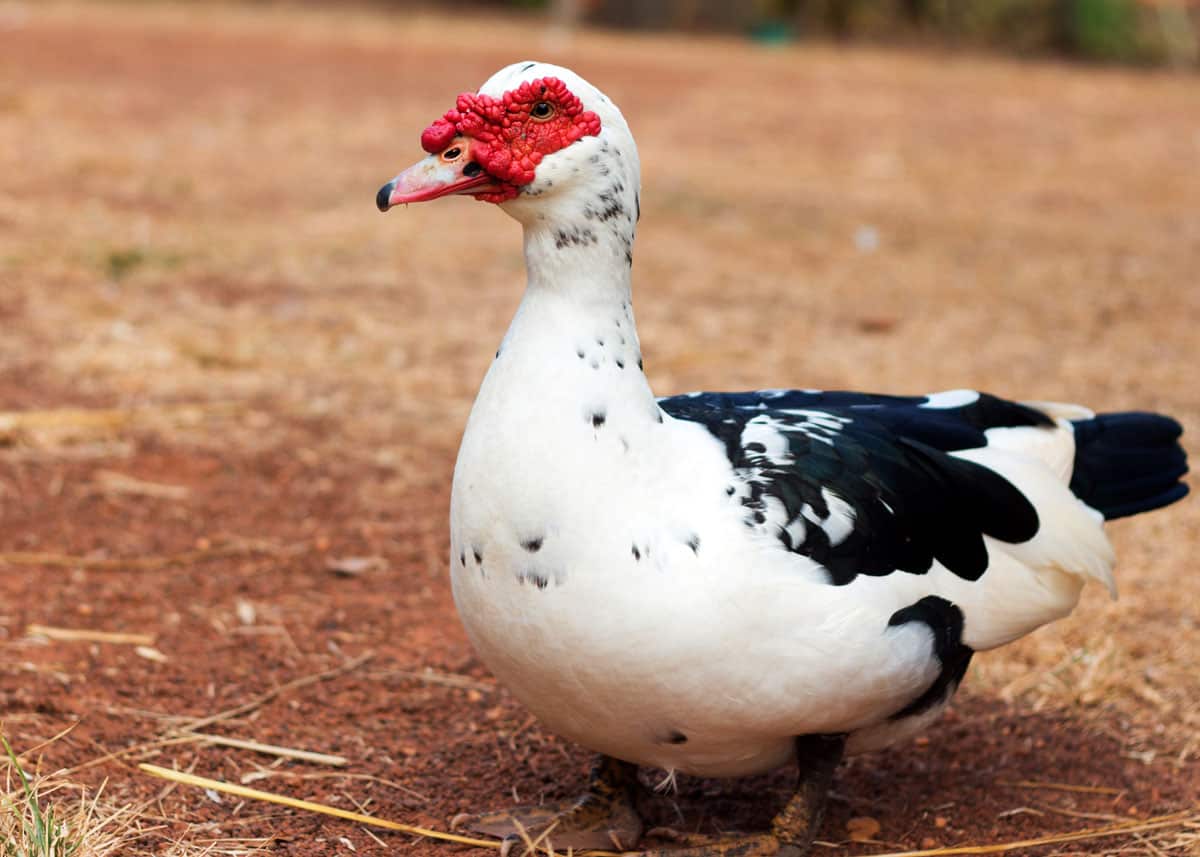
They also have caruncle, which are lumpy patches of skin that bulge or hang from the heads of birds. You’ve probably seen wattles on turkeys and roosters.
When people mention the “warty” appearance of a Muscovy duck, they’re referring to its caruncles.
2. Do all Muscovy ducks have red faces?
Yes, all Muscovy ducks have reddish faces. Some are a bright, vivid red while others are a muted orange-red, but they all have it.
As for the rest of their bodies, there can be some variations in color. Wild breeds tend to be darker while domesticated breeds are lighter.
For example, a wild Muscovy duck might be completely black with deep crimson wattles; a domesticated Muscovy duck might be white, brown, grey, yellow or lavender with neon red caruncles.
3. Why do Muscovy ducks have red faces?
The oil glands in the Muscovy duck’s caruncles are very important.
There are tiny, oily holes located in their caruncles, and when they groom themselves, they’ll preen and rub the oil all over their feathers. This protects them when they’re in the water.
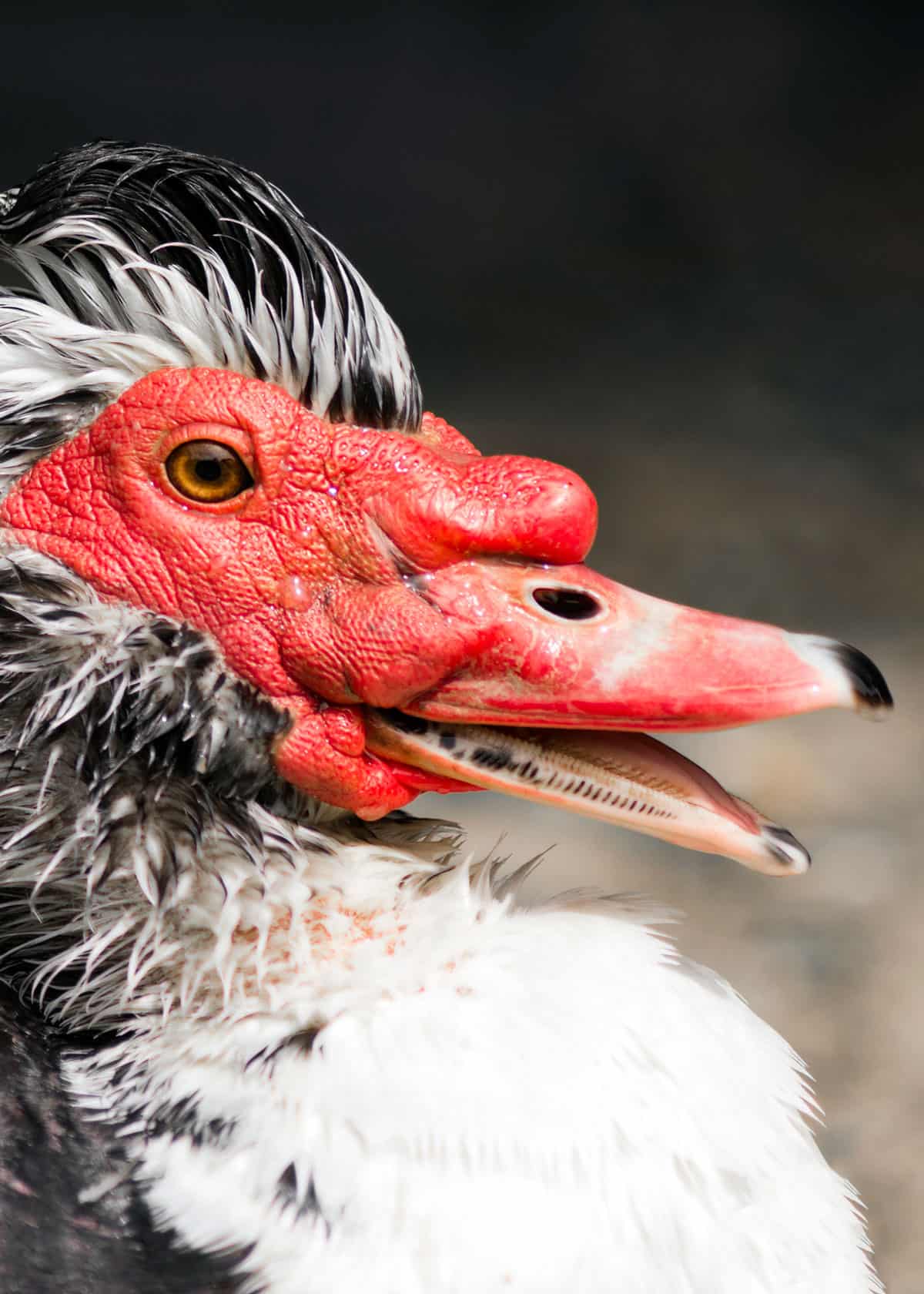
4. Is a Muscovy duck a goose?
No. Muscovy ducks are often confused with geese since they don’t act very duck-like. They don’t quack; they prefer trees to lakes. You can be forgiven for wondering if they’re ducks at all.
Scientifically speaking, however, Muscovy ducks are, well, ducks. They are different than the typical ducks in your local pond, though.
The ones that you’re probably most familiar with are mallards (anas platyrhynchos) while the Muscovy duck has its own unique classification (cairina moschata).
At the end of the day, they’re all breeds of waterfowl, so don’t stress over their status too much. Just know that Muscovy ducks are indeed ducks.
5. What are mule ducks? Are they related to Muscovy ducks?
“Mule ducks” are the offspring of male Muscovy ducks and female Pekin ducks.
They’re named after mules because mules are the offspring of male donkeys and female horses. Both of these cross-bred hybrids are infertile, but they have other uses around farms and zoos, so they can be valuable sources of income for breeders.
Quick fact: Mule ducks are the most popular source of foie grass, a luxury dish made with the liver of a duck that’s been specifically fattened for slaughter. Not my kind of thing, but to each his own!
6. How big is a Muscovy duck?
The average male is around 25 – 33 inches (63-83 cm) long and the average female is 20 – 25 inches (50-63 cm).
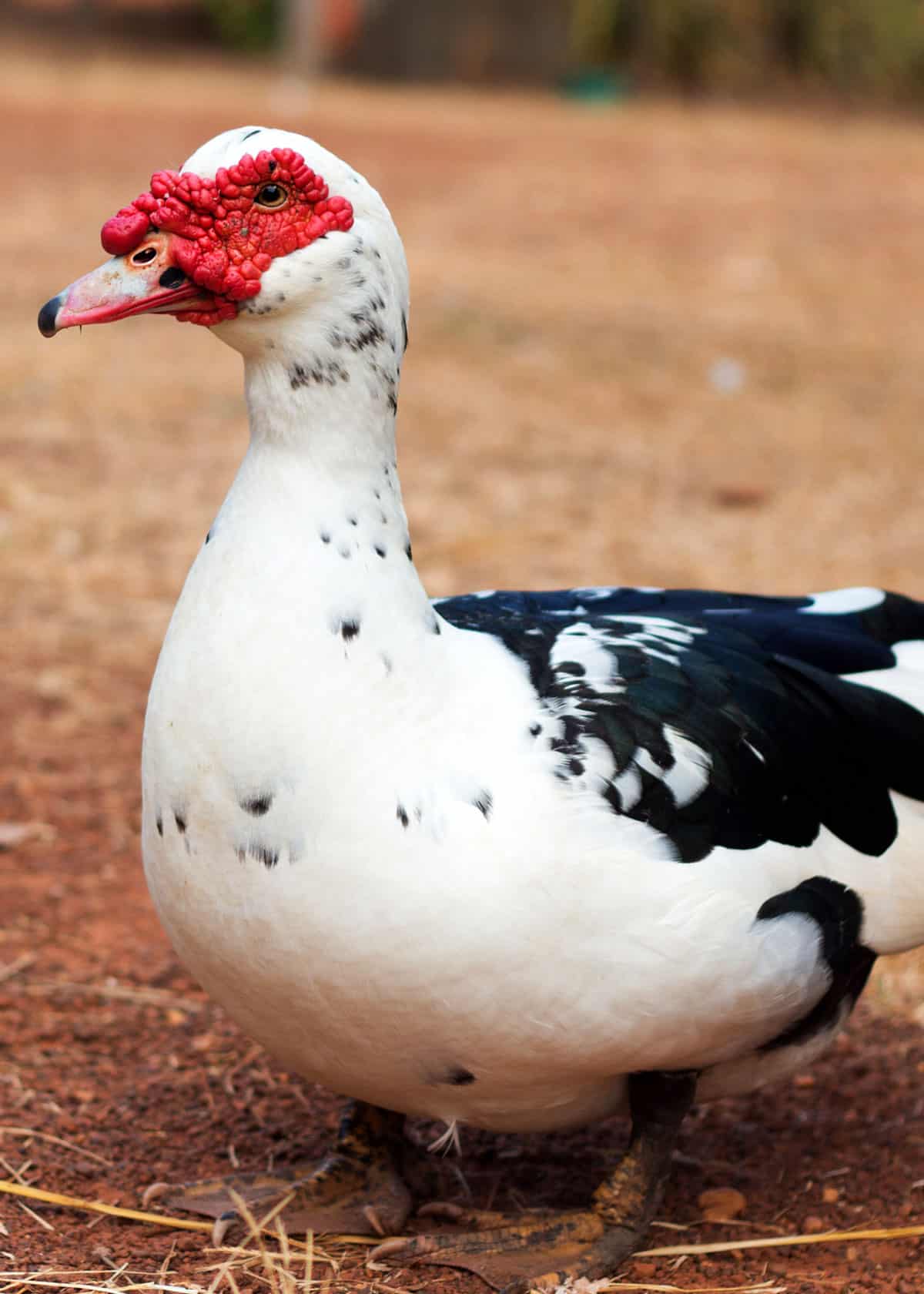
7. How much do Muscovy ducks weigh?
Muscovy ducks are hefty birds. Males are around 10 – 15 pounds (4.5-6.8 kg) and females are 6 – 8 pounds (2.7-3.6 kg). Domesticated breeds can get even larger than that.
The heaviest male Muscovy duck reached 18 pounds; that’s just a little lighter than my schnauzer dog!
8. What is the Muscovy duck’s wingspan?
Adult Muscovy ducks have a wingspan of 54 – 60 inches.
This is twice the size of a regular mallard, so it’s quite impressive when they fully stretch out. It’s one of the reasons why they’re often mistaken for geese.
9. How did the Muscovy duck get its name?
No one really knows where the name “Muscovy duck” came from, but there are a few theories.
The most probable explanation is that they’re named for a region of Russia near Moscow. “Muscovy” was its old name, and even though Muscovy ducks aren’t native to the area, they could’ve been exported there.
Another idea is that Muscovy ducks were named after a faraway place to give them value and make them seem exotic.
This wasn’t uncommon among traders and merchants in the Middle Ages; just like turkeys aren’t from Turkey and guinea pigs aren’t from Guinea, Muscovy ducks don’t have to be from Muscovy.
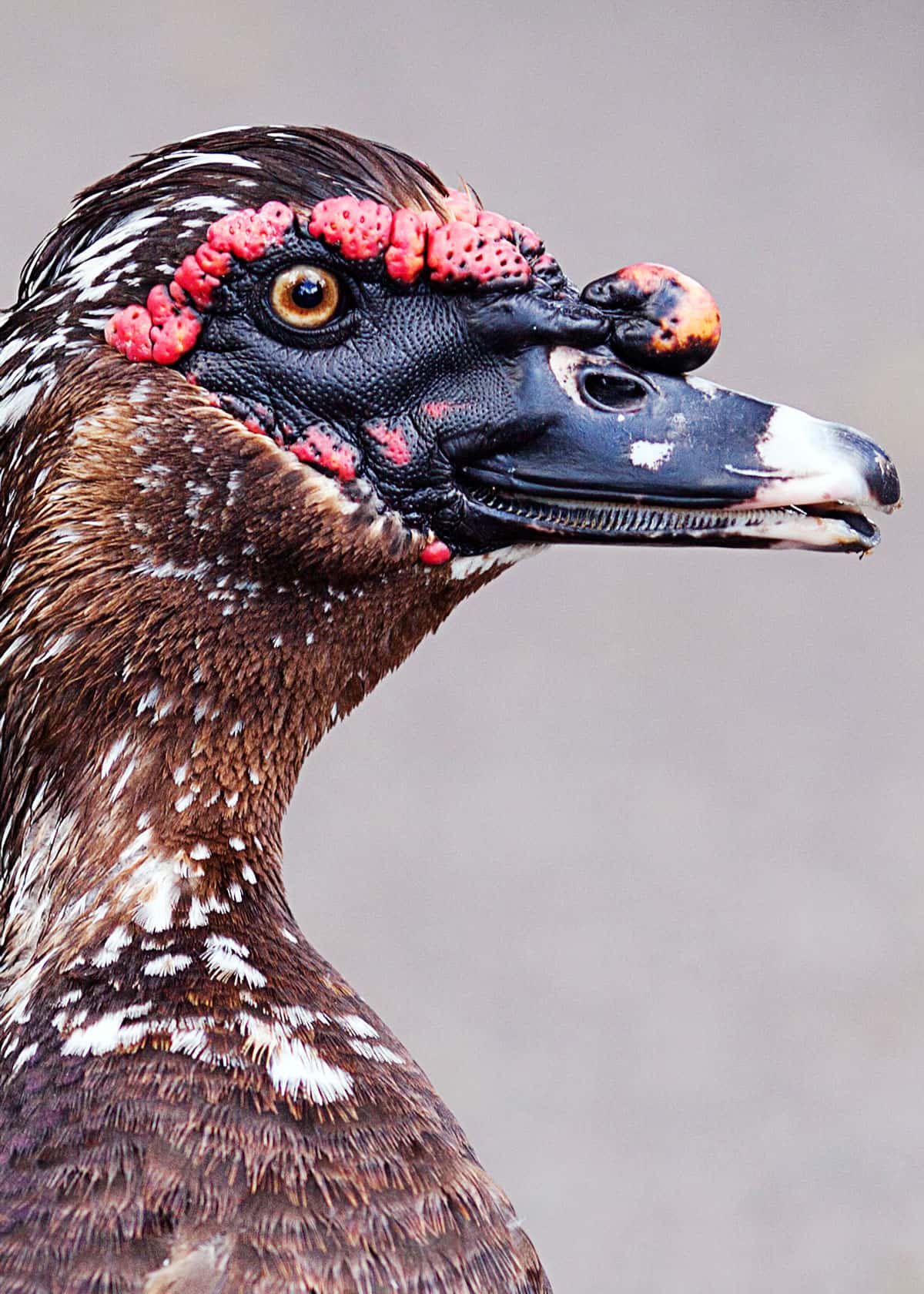
It’s also possible that they were named for the Muisca people of ancient Columbia. This puts them in the right time and the right region, and it’s not crazy to think that international traders mangled or misused variations of “Muisca” until it became “Muscovy.”
It’s even possible that the ducks began their lives as “Muisca” but ended them as “Muscovy” after people confused them with different waterfowl breeds from other lands.
Another possibility is that it was named after its musky odor.
We might not ever know the true origins of the Muscovy duck. Any ideas? Let us know in the comments!
10. What is the Muscovy duck’s Latin name?
The scientific name for the Muscovy duck is cairina moschata.
There’s also a sub-classification for the domesticated breed known as cairina moschata domestica.
11. Are there any other names for the Muscovy duck?
Different languages have different names for the entire species. For example, the Spanish term for Muscovy duck is pato mudo or “mute duck.”
In English, Muscovy ducks are also known as Barbary ducks. This is especially common in the culinary arts; many restaurants and cooking shows will talk about “Barbary ducks,” but it’s rare to see or hear a mention of “Muscovy duck” even though they’re the exact same thing.
Some people use “Barbary duck” to refer to dead or cooked ducks while “Muscovy duck” is used for living ones, but this practice isn’t widespread.
12. Are Muscovy ducks friendly?
It depends on the type of Muscovy duck that you’re trying to befriend. Wild ducks aren’t known for being sociable or agreeable, so if you’re traveling in South America and wondering if you should feed the flocks along the river, the answer is no.
If you’re talking about domesticated Muscovy ducks, however, they’re known for being quite friendly. They’re raised as livestock; they’re bought and sold as exotic pets.
They can learn to eat out of your hand and respond to a specific name. They can even wag their tail feathers, so it’s common for people to joke that they’re “puppy ducks” as they follow their owners around with their tails wagging and their eyes begging for a treat.
13. Are Muscovy ducks aggressive?
Muscovy ducks can get aggressive when they’re feeling bored, restless, territorial, frustrated, or hungry (just like me…).
They might also misbehave if they’ve reached sexual maturity but haven’t been provided a mate.
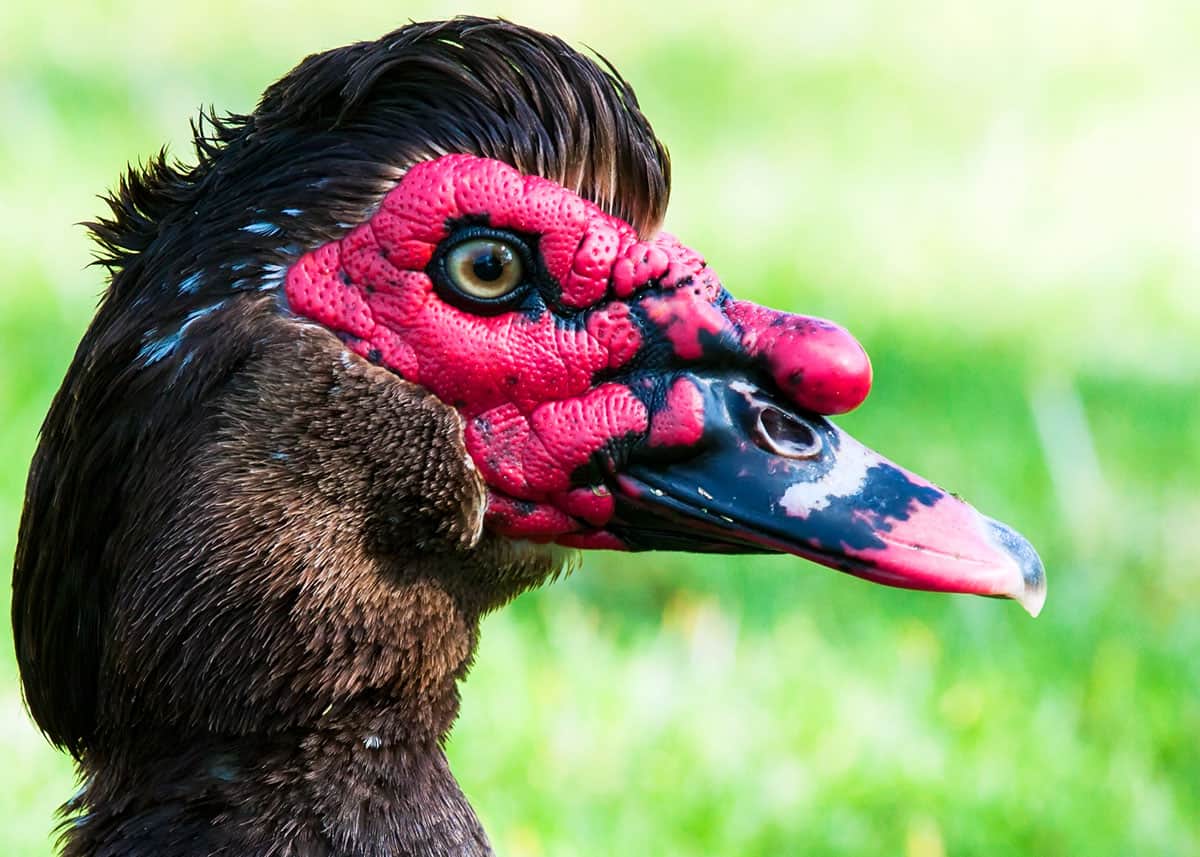
The good news is that Muscovy ducks can be trained out of their baser instincts. The trick is to start when they’re young. Respond swiftly to any signs of aggression with both verbal and physical commands, and don’t let them off the hook just because they’re young and cute.
While their snapping might seem adorable when they’re tiny, fuzzy ducklings, they’ll eventually grow into 10- and 15-pound birds and their snapping can do a lot more damage.
14. Can Muscovy ducks fly?
Muscovy ducks are excellent flyers. They’re quite fond of it, too, and it isn’t uncommon for a Muscovy duck to spend more time in the air than on the ground.
They like to perch on fences, sheds, rooftops, chicken coops and other places with height.
15. Do Muscovy ducks quack?
A quirky fact about Muscovy ducks is that they don’t quack.
They’re physically capable of it, and they can produce loud, quack-like sounds when stressed, but it isn’t a common feature of the species.
16. What sounds do Muscovy ducks make?
Muscovy ducks are known for their hissing. It’s a low, snake-like sound, but it isn’t necessarily a negative one. Muscovy ducks like to “chat” to both humans and animals by hissing at them.
It’s just how they communicate, and they do it when they’re happy, sad, agitated, excited and everything in between.
In addition, female Muscovy ducks can produce a cooing or trilling noise. It’s typically aimed at their babies. Unlike hissing, it’s almost always a happy or soothing sound.
17. Are Muscovy ducks loud?
Muscovy ducks aren’t very loud. Their hissing and cooing are often mistaken for whispering when people don’t realize what they’re listening to, and they don’t vocalize much in general unless there’s a reason for it.
The one exception to this is when they’re feeling chatty. If they’re in a large group, Muscovy ducks can start talking to each other and producing audible noises. Even then, however, they aren’t particularly boisterous. It will just sound like a group of people whispering instead of a single individual.
18. Why do Muscovy ducks wag their tails?
Many people are shocked when they see a Muscovy duck wagging its tail for the first time.
There are a few reasons why they do this, so if you own a Muscovy duck and are trying to interpret its mood, you’ll need to pay attention to context clues.
- Are they making noises and wagging their tails as they bob around your feet? They’re probably just being social.
- Are there other Muscovy ducks nearby? Is it mating season? They could be attracting the attention of potential suitors.
- Are they puffing themselves up or moving aggressively towards humans or animals? They might be wagging their tails to make themselves seem bigger and scarier. It’s a show of intimidation.
19. What are Muscovy ducks good for?
Despite their oddities, there are many reasons to keep a Muscovy duck around.
- They eat insects. If you have a problem with flies, ticks or mosquitoes, Muscovy ducks will keep their populations under control.
- They can be raised for both meat and eggs. Duck meat is a delicacy in many countries, and Muscovy ducks are said to taste even better than your traditional mallards. Their eggs are also said to be large and delicious.
- They can be bred with other duck species. These hybrids are often infertile, but they can be used for the production of foie gras.
- They make good companions for other livestock or wildlife. Since they’re quiet, non-quacking ducks, you don’t have to worry about Muscovy ducks being a nuisance on your farm. They’ll serve as laid-back companions for your other animals.
20. How long do Muscovy ducks live?
There hasn’t been a lot of research on the lifespan of Muscovy ducks, but anecdotal evidence suggests that they can live anywhere from 5 – 15 years.
A lot depends on their health, environment, breed, diet, reproductive cycles, and whether their owner decides they want duck for dinner.
21. Where does the Muscovy duck live?
Muscovy ducks are originally from South and Central America.
However, they’ve been bred, bought, sold, traded and exported so much that they can now be found in farms and zoos all over the world.
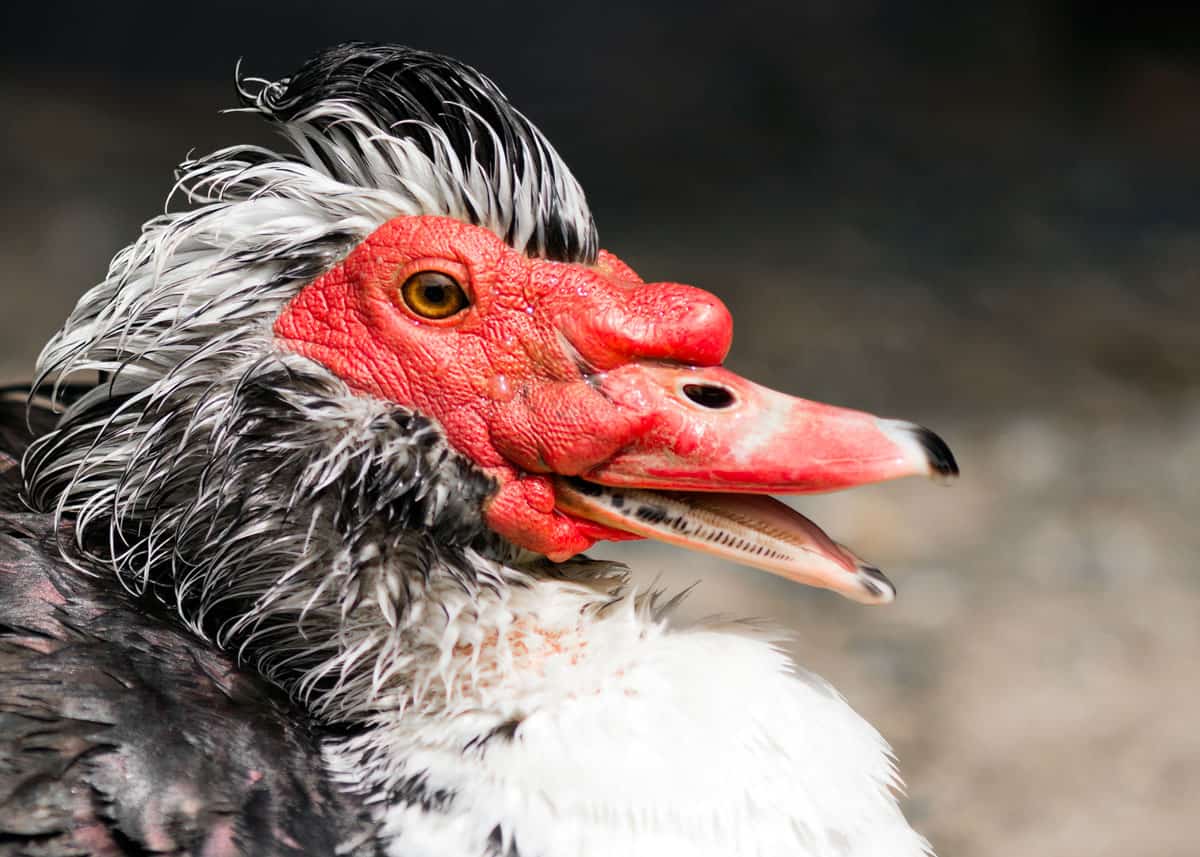
There are even wild populations cropping up in places like Mexico, Canada, France, and the United States.
22. What is the natural habitat of the Muscovy duck?
Like many duck species, Muscovy ducks like to live near water. They can make themselves at home in ponds, rivers, lakes, marshes, and swamps.
An unusual quality of Muscovy ducks is that they also spend a lot of time in trees. They can fly, and they have strong claws that are made for gripping, so they’re comfortable perching on all kinds of branches. Mothers even make their nests in trees.
23. What do Muscovy ducks eat?
Muscovy ducks aren’t picky eaters. They’ll consume weeds, grasses, and grains in addition to all kinds of insects, reptiles, crustaceans, and amphibians. They’re just as happy chomping on a snail as a plant root.
Muscovy ducks are particularly famous for eating bugs. One study put Muscovy ducks on dairy farms and observed their impact on the creepy-crawlies of the area. In a matter of days, they’d reduced the fly population by 96.8% and the maggot population by 98.7%. They don’t fool around when it comes to their favorite snack.
24. Will Muscovy ducks eat ticks?
Yes. Muscovy ducks will eat ticks, flies, crickets, caterpillars, grasshoppers, maggots, and many other insects. They’ll even forage for larvae and pupae.
They’re excellent at pest control since they’ll consume the insects at every stage of life.
25. Can you eat a Muscovy duck? What does it taste like?
Muscovy ducks are known for having tasty, tender meat that’s supposed to be more like beef than poultry. You can find it in high-class restaurants under the label “Barbary duck.”
Barbary duck meat is also renowned for having much less fat than your typical duck meat. It’s so lean that it’s considered kosher in parts of Israel, and it’s often advertised as a healthier alternative to salty, fatty meat dishes.
26. How can you tell if a Muscovy duck is male or female?
The easiest way to tell the difference between male and female Muscovy ducks is their size.
Males are usually twice as large as females. They also tend to have brighter colors.
27. What do you call male and female Muscovy ducks?
Male ducks are called drakes. Female ducks are called hens.
28. What do you call a group of Muscovy ducks?
In groups, you can refer to them as flocks, teams, rafts or paddlings.
29. Do Muscovy ducks mate for life?
No, Muscovy ducks don’t mate for life. Unlike other species of duck, Muscovy ducks don’t form stable pairs.
They might return to the same mate if no other options are available, but in the wild, they’ll look for different partners with every mating season.
30. When do Muscovy ducks lay eggs?
The mating season for Muscovy ducks is between August and May. Males will attract females by wagging their tails and puffing up their crests.
When a female gets pregnant, she’ll form a nest in a tree hollow and lay her eggs in safety and security. The incubation period is between 30 – 35 days.
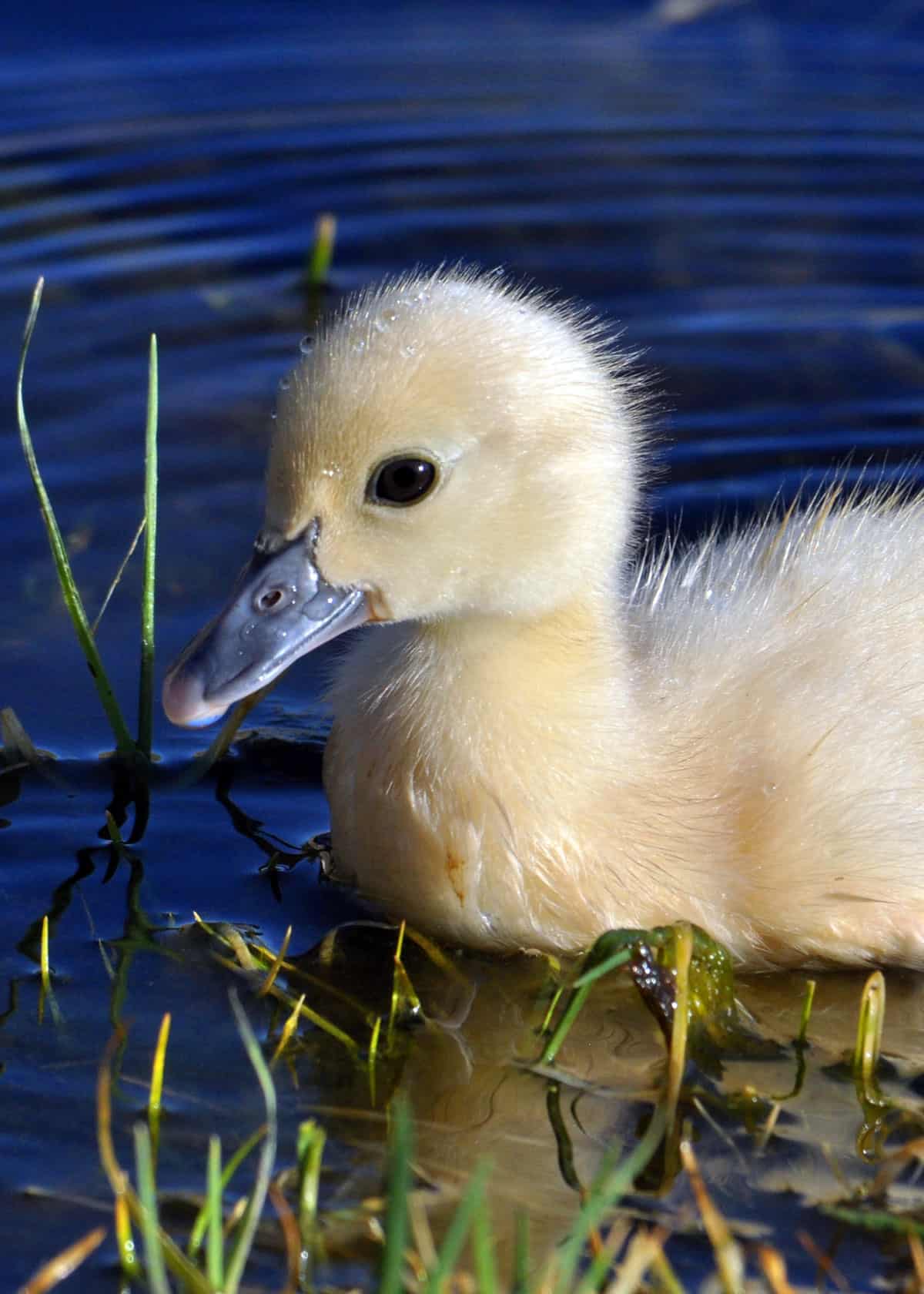
Adorable Muscovy duckling in a lake
Moms will fiercely guard their eggs during this time; they’ll only leave their nests once a day to drink some water or take a quick bath. Then, it’s right back to their babies.
31. How many eggs does the Muscovy duck lay? What do they look like?
Female Muscovy ducks lay 8 – 15 eggs at a time. They’re quite large, which is one of the reasons why they’re so prized. They can weigh twice as much as chicken eggs.
32. Are Muscovy ducks considered an invasive species?
Yes. They might be valuable to farmers who know how to handle them, but for everyone else, Muscovy ducks can be a real nuisance.
They leave droppings everywhere; they rip up lawns with their sharp claws; they create nests in patios, bushes, balconies and other residential areas. They can also damage ecosystems by killing all of the insects.
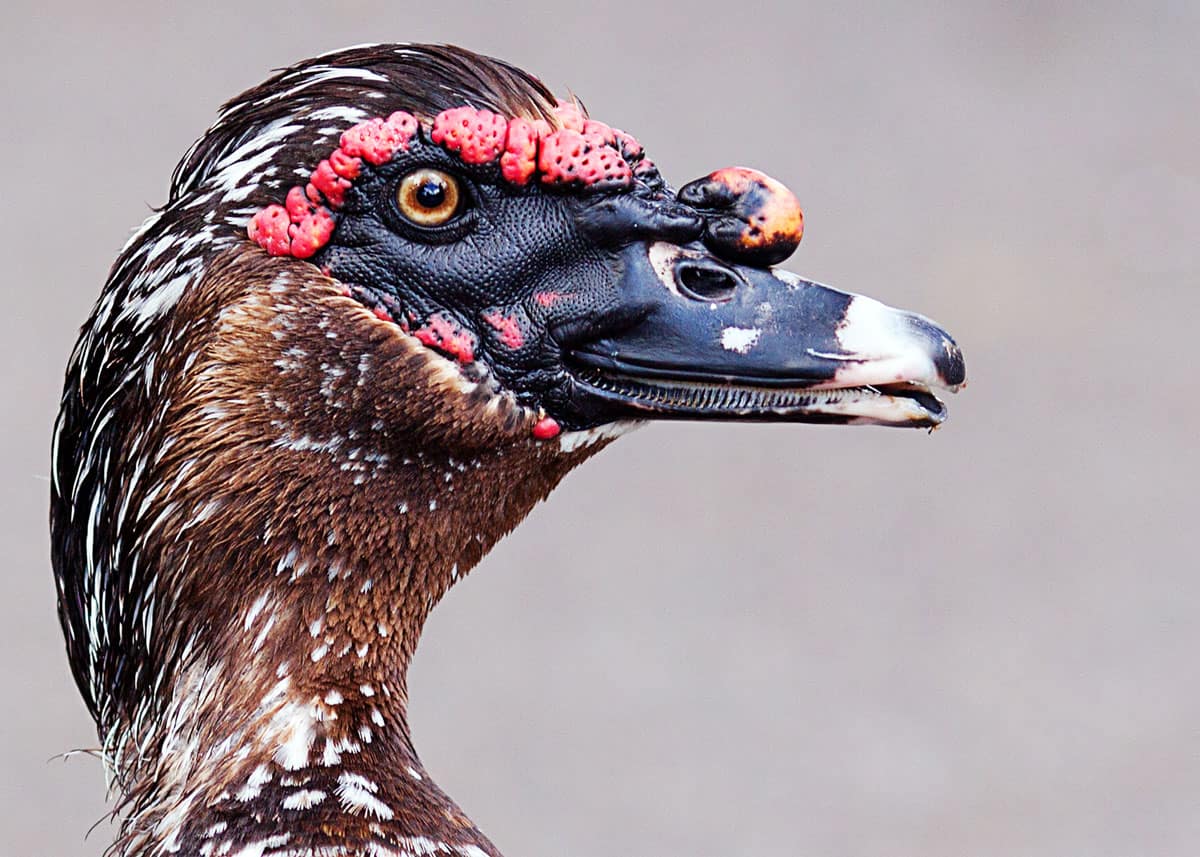
For these reasons, Muscovy ducks are considered an invasive species in many parts of Mexico, Canada, and the United States. There are even laws in place for people who want to buy them.
For example, in states like Florida, you aren’t allowed to raise Muscovy ducks for hunting purposes because they might escape your clutches and form wild populations that are difficult to control.
33. Tips for Getting Rid of Muscovy Ducks
Sure, these birds are pretty interesting; but you may not want them to make your home their home. Here are just a few ways that you might curb the local population of Muscovy ducks.
- Kick Them Off Your Property. The easiest way to get rid of Muscovy ducks is to literally remove them from your land, no need to have them killed. You might not want to do this on your own; the ducks can be heavy and hard to handle, and you could run afoul of local laws if you wind up killing them. Call a nearby wildlife service instead. They should have trained professionals who can take away the ducks for you.
- Sterilize the Eggs. (I personally would never do this, I love animals too much and it seems wrong to me, but it is a common practice.) If you’ve discovered a nest under your shrubbery, you might be tempted to break all of the eggs to keep them from hatching. However, this will only encourage the mother to lay more. A better option is to shake the eggs and keep them from becoming viable. It will take the mother a while to realize what’s happened, and you can start other anti-duck measures in the meantime.
- Make Your Yard Unappealing. There are a number of ways that you can discourage Muscovy ducks from living and breeding on your property. For example, you can cover your pools and drinking trenches so that they aren’t called to the water. You can install lights, alarms, and noise-makers to scare them off. You can also buy a guard dog that will bark whenever they get too close.
- Trap Them. If there are only a couple of strays waddling around your property, it’s relatively easy to lure them into a covered enclosure and trap them. Just make sure that you don’t relocate them on your own. Call a wildlife service and let them deal with it. Since Muscovy ducks are an invasive species, you don’t want to release them somewhere and cause a new population to grow.
These are four common ways that people deal with unwanted muscovy ducks.
As a bit of a tree hugger, I would definitely suggest going with the non-baby-murdering choices, but that’s just me. There are plenty of ways to get rid of them without killing them!
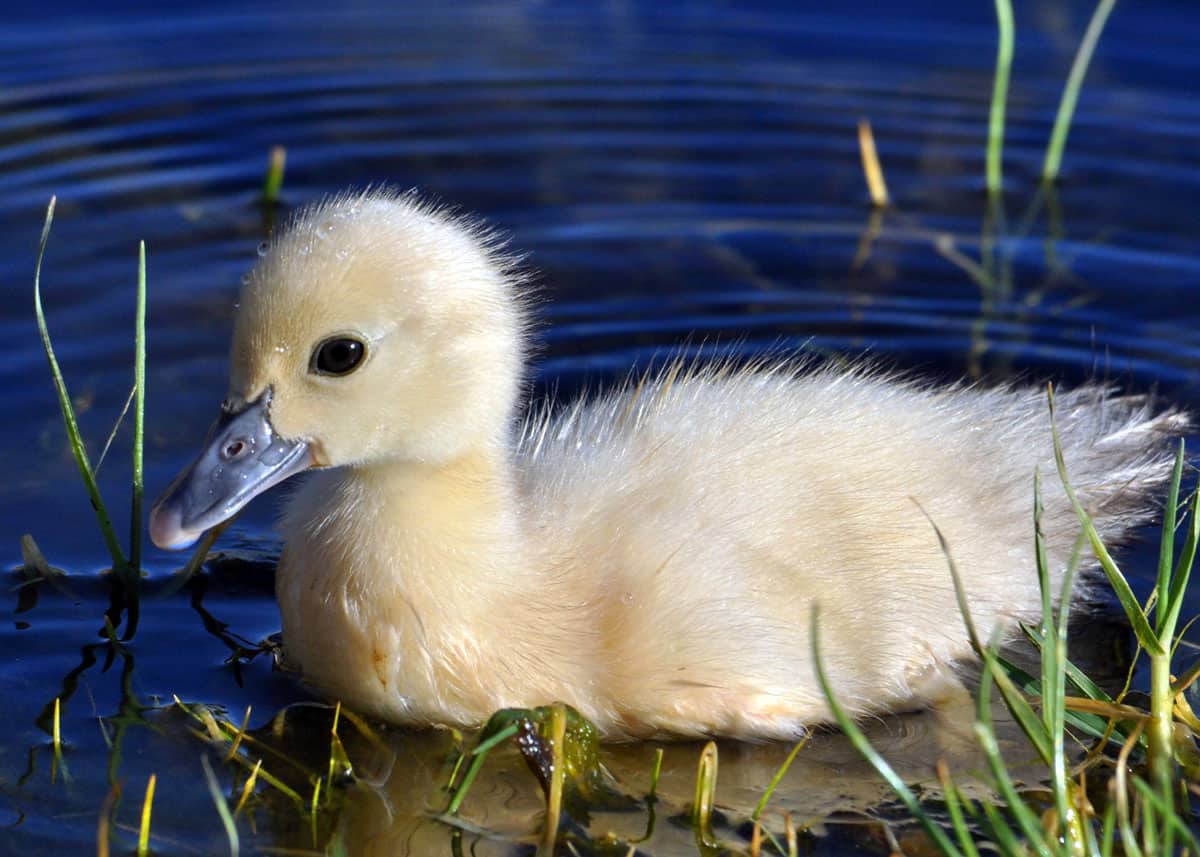
Delightful Ducks
We hope you enjoyed learning about Muscovy ducks! What was your favorite fact? Did we miss something important? Let us know in the comments below!
Drew Haines is an animal enthusiast and travel writer. She loves to share her passion through her writing.
She graduated high school at sixteen and started her own business, Everywhere Wild Media. And she runs Everywhere Wild and JustBirding. She also guest blogs on Storyteller.Travel
She lived in Ecuador for 6 years and explored the Galapagos Islands. Currently based in N.S., Canada.

Janine
Wednesday 23rd of August 2023
I recently came home after a long trip to find a large Muscovy male hanging out on my patio. When he saw me through the patio door, he began pecking at the glass. Thought this odd behavior. I didn't have any bird food and worry about feeding the wildlife, but I also could not have him hammering away at the glass. So I checked a website to find it was ok, but not great, to give him dry cat food. He gobbled it down. It doesn't seems that he'll be going away, so I will pick up some appropriate snacks for his morning visits.
Phyllis
Saturday 16th of July 2022
Thanks for the very interesting info on Muscovy ducks. We’ve been seeing these guys for 2 years, couldn’t find them in my bird book. Good to know!
K Lester
Sunday 10th of July 2022
In dealing with an over population of Muscovys in my area of southern Louisiana we have found that most government 'relocation' groups do not relocate, but kill the ducks. Anyone calling for relocation assistance should ask where they're going and offer to follow them when they bring the ducks.
Lisa
Wednesday 18th of May 2022
Loved your facts. We have a Muscovy duck that hangs out in our very large backyard by the river. He hangs with the honkers all day and appears to be “den mother “ to them all. When the geese come with the babies, he guards over them. We have named him Lucky. He comes to the call of his name, most days, and definitely wags that tail when we toss grains to him. I called him “ugly black chicken” when he first arrived,,, and then renamed him Lucky as we got to know each other. I’m still a little Leary about hand feeding him, as he is about taking it, but I’m sure we,ll get there one day. He showed up just about a year ago. Most days, when I awake, he’s standing by my deck, down on the grass, waiting for his “breakfast”. I love him !,,
Karen
Thursday 22nd of July 2021
I have a young Muscovy (2month old). She does not have any caruncles on her head. When will they appear?